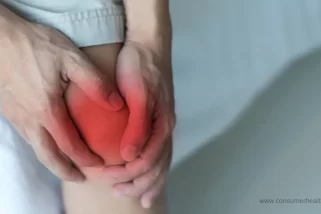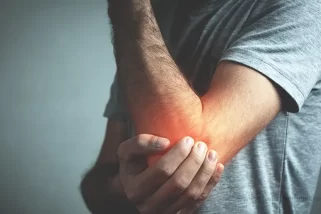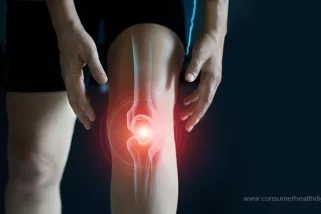Arthritis is a common condition that causes joint pain and stiffness for many people worldwide. It develops when the protective cartilage in our joints breaks down over time, causing the bones to rub together. This friction results in inflammation and, often, debilitating pain. An estimated 58.5 million US adults have arthritis. Experts believe that number will grow as our nation’s population gets older.[1]

For arthritis sufferers, even simple movements like bending down or climbing stairs can become difficult. The condition affects people of all ages but becomes more prevalent with age.
Joint pain from arthritis can greatly impact one’s quality of life and ability to actively participate in daily activities. While conventional medications provide relief for many, they sometimes come with undesirable side effects. Therefore, it is worthwhile to explore natural remedies that may help alleviate arthritis symptoms without pharmaceutical interventions.
Natural remedies offer a holistic approach focused on whole-body wellness rather than just symptom treatment. Herbal supplements, dietary changes, and physical therapies are examples of natural options that research increasingly shows may be effective complementary treatments for arthritis joint pain and inflammation.
But, first let’s get into details of Arthritis
Arthritis refers to joint inflammation and pain from over 100 conditions that affect the joints. The two most common types are osteoarthritis and rheumatoid arthritis.
Osteoarthritis, also known as “wear and tear” arthritis, develops from normal wear on the joints over time. It usually affects joints like the knees, hips, lower back, and fingers. Cartilage breaks down and bone ends rub together, causing pain, swelling, and stiffness. Osteoarthritis affects over 30 million Americans and is more prevalent with age.
Rheumatoid arthritis is an autoimmune disease where the immune system attacks the joints, causing painful swelling. It often affects the small joints in the hands and feet symmetrically. In addition to joint pain, rheumatoid arthritis can cause fatigue, morning stiffness lasting over 30 minutes, and sometimes affect other organs. Approximately 1.5 million Americans have rheumatoid arthritis.
Common symptoms of arthritis include joint pain, tenderness, swelling, redness, warmth, and a reduced range of motion. The causes of arthritis pain vary depending on the type. For osteoarthritis, risk factors include joint injuries, obesity, genetics, and aging. Rheumatoid arthritis is thought to be triggered by genetic and environmental factors, though its exact cause is unknown. Both genetic and lifestyle factors play a role in developing arthritis.
Natural ways for treating Arthritis
Lifestyle Changes
Diet and nutrition play an important role in managing arthritis symptoms. A balanced diet rich in anti-inflammatory foods can help reduce joint pain and stiffness. Foods like fatty fish, nuts, fruits, and vegetables contain omega-3 fatty acids and antioxidants shown to decrease inflammation. Maintaining a healthy weight is also beneficial, as extra pounds put more stress on weight-bearing joints.
Regular exercise, especially low-impact activities, can strengthen muscles around joints and improve mobility. Activities like swimming, water aerobics, walking, and biking are gentle on joints while delivering fitness benefits. Losing even a small amount of weight through diet and exercise can lessen pressure on sensitive joints. Proper rest is equally crucial. Getting enough quality sleep allows the body to recharge and heal.[2]
Stress management techniques may complement other lifestyle strategies. Chronic stress places long-term strain on the body and intensifies inflammation. Practices like yoga, tai chi, meditation, and deep breathing help relax both the mind and muscles.
Making small, sustainable changes in diet, exercise, rest, and stress relief offers natural, drug-free arthritis relief without harsh side effects. A balanced lifestyle approach that addresses the root causes of joint inflammation may help relieve arthritis symptoms without relying solely on medications.
Natural and Herbal Remedies

Natural and Herbal Remedies. Shutterstock Image
- Several herbal supplements have anti-inflammatory properties that may help ease arthritis symptoms. Turmeric contains curcumin, which studies show reduces joint swelling and tenderness. Ginger and Boswellia serrata supplements block inflammatory compounds.[3]
- Dietary modifications focus on increasing anti-inflammatory omega-3 fatty acids[4] from foods like salmon, walnuts, and flaxseeds. Consuming produce rich in antioxidants like berries, broccoli, and leafy greens fights inflammation. Avoiding red meat and processed foods may also provide relief.[5]
- Applying heat or cold to sore joints brings additional comfort. Heat from a warm bath, heating pad, or hot water bottle increases blood flow and relaxation of tense muscles around joints. Ice reduces swelling and pain from sudden flare-ups.
- Acupuncture and acupressure target pressure points near and distant from painful areas to stimulate natural pain relief. According to Dr. Carrie J. Graves, Acupuncture Physician, acupuncture is a valuable intervention for reducing pain and inflammation associated with this condition. Studies have shown that acupuncture can stimulate the release of endorphins and other natural pain-relieving chemicals in the body, thereby reducing pain and improving joint function. This can be a vital component of reducing pain for individuals who have felt they are too inflamed to participate in physical therapy or daily movement.
- Epsom salt baths and essential oil massages are effective natural home remedies for arthritis. Epsom salt contains magnesium sulfate. It reduces inflammation and eases sore muscles when absorbed through the skin in a warm bath. Essential oils such as lavender and eucalyptus applied in a gentle massage also relieve pain and stiffness in joints and muscles.[6]
These traditional medicine practices re-balance the body and help in relieving Arthritis.
Exercise and Physical Therapy
Certain low-impact exercises are ideal for arthritis patients, as they can help improve joint mobility and reduce pain over time. Walking, swimming, and water aerobics are excellent options, as they allow movement without pounding on joints. Yoga and tai chi focus on gentle stretches and building flexibility. Strength training with light dumbbells or resistance bands also helps support joints without high-impact movements.[7]

Exercise and Physical Therapy – Shutterstock Image
Physical therapy plays an important role in arthritis management. Therapists can design customized exercise plans tailored to a person’s abilities and limitations. Strengthening and stretching targeted muscle groups alleviates pressure and improves function.
Assistive devices like braces and canes recommended by a physical therapist can also help protect joints during daily activities. Regular sessions help patients learn exercises for independent home practice to maintain gains.
Oh Wait ! Consultation and Professional Care is Equally Important
While natural remedies provide relief, consultation with a healthcare provider is important for properly managing arthritis. A doctor can conduct tests to determine the specific type and severity of the condition. This helps create a tailored treatment plan utilizing the appropriate combination of lifestyle changes, medications, and other medical interventions.
For some patients, over-the-counter medications may not control joint inflammation and pain effectively. In these cases, prescription drugs prescribed by a doctor can help. Regular checkups allow doctors to monitor progress and adjust the treatment approach as needed.
Seeking medical guidance ensures natural remedies do not interfere with prescribed treatments and helps catch any complications early. A team-based approach combining professional care and self-care leads to the best long-term arthritis outcomes.
Conclusion
Making positive lifestyle changes and considering natural remedies can significantly help arthritis sufferers manage their symptoms. However, it is always best to consult your healthcare provider before beginning any new treatment plan. A medical professional can assess your individual condition and needs to ensure natural options do not conflict with standard care.
Together, you can design a personalized, integrated approach using both conventional and complementary strategies.
While arthritis presents ongoing challenges, focusing on nutrition, exercise, stress relief, and rest empowers patients to play an active role in their wellness. With guidance from doctors and alternative practitioners, people with arthritis can find effective ways to minimize joint damage and pain. Small improvements to daily activities and mindset can make a big difference in living more comfortably with this condition.
8 Sources
We review published medical research in respected scientific journals to arrive at our conclusions about a product or health topic. This ensures the highest standard of scientific accuracy.
[2] Physical activity, exercise and rheumatoid arthritis: https://pubmed.ncbi.nlm.nih.gov/31203925/
[3] Herbal COX-2 Inhibitors: https://www.huhs.edu/literature/COX-2%20Inhibitors.pdf
[4] Foods that fight inflammation : https://www.health.harvard.edu/staying-healthy/foods-that-fight-inflammation
[5] Biological activities of berries: from antioxidant capacity to anti-cancer effects: https://pubmed.ncbi.nlm.nih.gov/16498207/
[6] Epsom Salt and Mineral Baths for Arthritis: https://creakyjoints.org/alternative-medicine/epsom-salt-mineral-baths-arthritis/
[7] The effect of physical exercise on rheumatoid arthritis: https://pubmed.ncbi.nlm.nih.gov/33176012/








 This article changed my life!
This article changed my life! This article was informative.
This article was informative. I have a medical question.
I have a medical question.
 This article contains incorrect information.
This article contains incorrect information. This article doesn’t have the information I’m looking for.
This article doesn’t have the information I’m looking for.